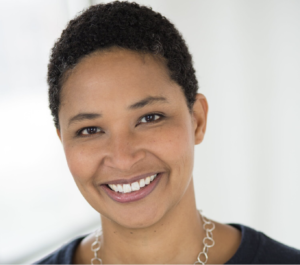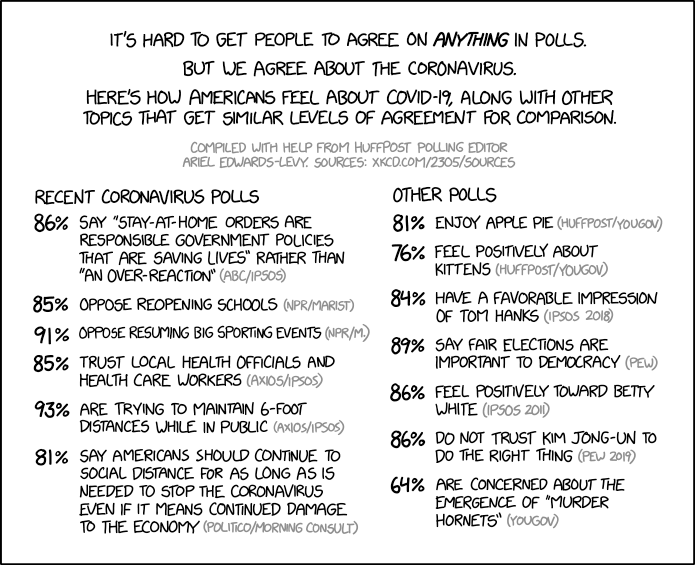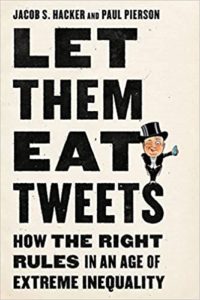by Henry Farrell on April 19, 2021

I imagine that many Crooked Timber readers are familiar with Danielle Allen – her book, Our Declaration, was the subject of a Crooked Timber seminar a few years ago. However, some people may not know that she is in the early stages of running for governor of Massachusetts. She is an extraordinary person, and would do extraordinary things if she were elected. I’m writing this both to endorse her (in a purely personal capacity – this is not a general CT endorsement, although I know that some other posters also know her and think she’s wonderful) and to suggest that if you agree and are in a position to, you should donate to her campaign.
The reason that I support her isn’t that she’s one of the finest academic political theorists of our age (she is; but that is beside the point). It’s that she is uniquely capable of bridging between a deeper understanding and the ordinary business of politics. I can’t think of anyone who even comes near to her ability to weave the two together to good purpose. She’s also someone who identifies problems and gets things done. And she has the kind of charisma that stems from deep moral seriousness combined with kindness and a real delight in other people.
The question is getting her to the place where voters can see who she is. This is a tough race – for starters, Democratic politics in Massachusetts is dominated by a well-oiled party machine. But it is far from impossible for her. A lot depends, as everywhere else in American politics, on money. Endorsements and political support depend on whether she can demonstrate that she has enough financial support from enough people. It helps that Massachusetts has donation limits that are lower than in many other states, making it harder for big donors to swamp the process. It also helps that her fundraising got off to a strong start, but a strong start isn’t enough on its own.
That’s why I’m asking that you donate, if you are a US citizen or a permanent resident, and are in a position to support her. If you want to find out about her campaign, you can get more information here. And if you want to find out more about how she helped shape the response to coronavirus, more details are here. There aren’t many people who have what it takes to potentially transform politics, if they get the chance. I believe she’s one of them.
by Henry Farrell on January 26, 2021
Mike Konczal has a new book, Freedom from the Market (Bookshop.org locator, Amazon). I’ve been wanting to write about this book for a while, but first had to wait for it to come out, and then had my working life banjaxed by the madness of the last few weeks. But it is a great book that looks to remake the American debate about freedom and largely succeeds. Full disclosure: Mike is a friend of the ‘see very occasionally but like very strongly’ variety; I also read an early version of the mss and commented on it. [click to continue…]
by Henry Farrell on January 8, 2021
by Henry Farrell on September 19, 2020
After Ruth Bader Ginsburg’s death, we are going to see more debate over the norms on judicial nominations and whether they should be observed. The so-called “McConnell rule” – that the Senate should block Supreme Court nominations in the last year of their term to allow the people their say – is giving way to an equally fanciful McConnell exception stipulating that the rule only applies when Senate and President belong to different parties. So the question then emerges of how the Democrats should respond, if McConnell and Trump manage to get a Supreme Court nomination through, perhaps in the Senate’s lame duck session. Should they accept this or should they push back, perhaps through adding another two seats to the Court, something which is allowed under the Constitution, but that pushes back against long standing norms? [click to continue…]
by Henry Farrell on September 11, 2020
This is a post I’ve been meaning to write for a few years, and the impending publication of Susanna Clarke’s new book, Piranesi, has finally prompted me to get off my arse and do it. The short version – Clarke’s first book, Jonathan Strange and Mr. Norrell is deeply beloved, as it damn well ought to be. But it’s often misclassified. Because it is so funny and charming, people tend to read it as whimsical, but beneath the whimsy lies the weird. It’s usefully read (as Clarke herself suggested in her contribution to the seminar we ran with her), as a book about the weirdness of the English landscape, and in a backhanded way about Piranesi too.
[click to continue…]
by Henry Farrell on August 4, 2020
by Henry Farrell on July 24, 2020
Andrew Gelman has a post on the benefits of negative criticism, where he talks about the careful methodological demolitions he has done of others’ research that he has found to be slipshod.
if you want to go against the grain you have to work harder to convince people. My point is that this is the exact opposite of Cowen’s claim that following his advice “Avoid criticizing other public intellectuals. In fact, avoid the negative as much as possible” will force you to keep on thinking harder.
I’m in favor of a strong culture of criticism, but for a quite different reason: because serious criticism is probably the most valuable contribution we can make to the cognitive division of labour. There’s a possibly mistaken understanding of a truly excellent social science book behind this argument. [click to continue…]
by Henry Farrell on July 20, 2020
This Paul Krugman column helped crystallize the weirdness of the ongoing economists versus epidemiologists spat, perhaps more accurately described as the ‘some economists, especially those with libertarian politics, versus epidemiologists spat.’ Different theories, in turn below the fold.
[click to continue…]
by Henry Farrell on June 22, 2020
by Henry Farrell on June 14, 2020
Police forcing a protestor to bump them
[Reader Attention Conservation Notice: This post consists of me trying to make the obvious a little more precise, at considerable length. Since it’s on topics where I have no obvious expertise, I may very possibly not only be reinventing the wheel, but adding superfluous corners].
The video linked above has been doing the rounds on social media. A protestor is arguing with a police officer, who moves in front of him and then (clearly quite deliberately, from the body language) stops suddenly, so that the protestor has no choice but to bump into the officer. This then provides a pretext for the police to swarm the protestor and subdue him, presumably on the theory that he has physical assaulted the officer. Up to a couple of weeks ago, this kind of technique wouldn’t have gotten much public attention. Some of the problems (certainly far from all) with the police in the US and elsewhere, reduce down to the problem of how much discretion police should be allowed. Much of this problem, in turn, reduces down to what might be called the discretion to escalate. [click to continue…]
by Henry Farrell on June 9, 2020
Bleeding Heart Libertarians is no longer publishing new material. The final post is here. It’s an end worth noting, because it seems to me (I have no very specific knowledge, and have deliberately not asked any of the principals involved) to say something bigger about what is happening to libertarianism. [click to continue…]
by Henry Farrell on May 28, 2020
From a new article in Stat.
In a four-day blitz at the end of April, they swabbed and drew blood from 4,160 adults and children, including more than half of the residents in the 16 square blocks that make up San Francisco Census Tract 229.01. In the heart of the Mission District, it is one of the city’s most densely populated and heavily Latinx neighborhoods. While Havlir expected to see the Latinx community hit hard by the virus, the actual numbers came as a shock. About 2% of people tested positive for the coronavirus. Nearly all of them — 95% — were Latinx. The other 5% were Asian or Pacific Islander. Not a single white person tested positive, though 34% of the tract’s residents are white, according to the U.S. Census; 58% are Hispanic.
… One of Havlir’s motivations for the testing was to understand how the virus was being transmitted even after the city had been locked down for six weeks. Questionnaires administered with the tests gave her an answer: 90% of those who tested positive could not work from home. Most were low-income, and most lived in households with three or more people.
“What really comes out of these data is that low-wage essential workers are victims of this disease,” Havlir said. Many of those infected were working in food service, making deliveries, or cleaning offices despite shutdown orders. “These people were out working the entire time,” she said.
“Anecdotally, we knew this, but the hard data is heartbreaking,” said Susana Rojas, executive director of the Calle 24 Latino Cultural District and a leader of the Latino Task Force for Covid-19 that partnered with UCSF to run the study. “Our community was out working, keeping the city moving and fed. Of course they were more exposed and getting sick.”
by Henry Farrell on May 12, 2020

An addendum to my earlier post, to explain more directly why I am skeptical of the argument that public choice is a useful lens to understand the politics of the public during coronavirus. Shorter version: if the “public” is indeed some kind of equilibrium, then the underlying game is unlikely to be the kind of game that public choice scholars like to model. [click to continue…]
by Henry Farrell on May 5, 2020
Tyler Cowen quotes approvingly from a Robin Hanson post (the URL suggests that the original title of Tyler’s post was “On Reopening, Robin Hanson is Exactly Correct).
While the public tends to defer to elites and experts, and even now still defers a lot, this deference is gradually weakening. We are starting to open, and will continue to open, as long as opening is the main well-supported alternative to the closed status quo, which we can all see isn’t working as fast as expected, and plausibly not fast enough to be a net gain. Hearing elites debate a dozen other alternatives, each supported by different theories and groups, will not be enough to resist that pressure to open.
Winning at politics requires more than just prestige, good ideas, and passion. It also requires compromise, to produce sufficient unity. At this game, elites are now failing, while the public is not.
… More broadly, this is an example of why we need public choice/political economy in our models of this situation. It is all about the plan you can pull off in the real world of politics, not the best plan you can design. A lot of what I am seeing is a model of “all those bad Fox News viewers out there,” and I do agree those viewers tend to have incorrect views on the biomedical side.
This all begs an obvious question: who exactly is the “public” that they are talking about? [click to continue…]
by Henry Farrell on May 4, 2020
The website Five Books did an interview with me on the five best books on the politics of information. It was an interesting experience. Picking the best five books means that you have to go back and re-read them, and figure out how they fit together.
What I decided to do was to take this essay by Ludwig Siegele in the Economist’s Christmas issue, and start from the question: If you wanted people to build out from that essay, what books would you have them read? The essay is influenced by Francis Spufford’s Red Plenty, and the Crooked Timber seminar that followed from it (in particular: Cosma’s essay): what it sets out to do is to ask whether the socialist calculation debate helps us to understand current fights about democracy, autocracy, markets and machine learning. Like Ludwig, I believe that it does: “Comrades! Let’s Optimize” is an excellent starting point for understanding how people in Silicon Valley today think about the transformative power of software. I also think that Red Plenty is an excellent starting point for thinking about these questions because it is a novel rather than a tract. As Francis said in his reply, writing fiction gives you access to negative capability: rather than stating an argument or a principle, you can have a multiplicity of voices and experiences, providing a kaleidoscopic rather than a synoptic understanding of the problem. When it’s a complex problem, that’s helpful.
A certain kind of autobiography can pull off a similar trick: hence the structure of the interview is that it starts off with Red Plenty and finishes with Anna Wiener’s wonderful account of living in Silicon Valley, sandwiching the social science between these two more complicated narratives. It’s a long interview (about 10,000 words!) and has nothing about coronavirus (it was conducted in February), but I think it worked out well. Read if interested; ignore if not.


